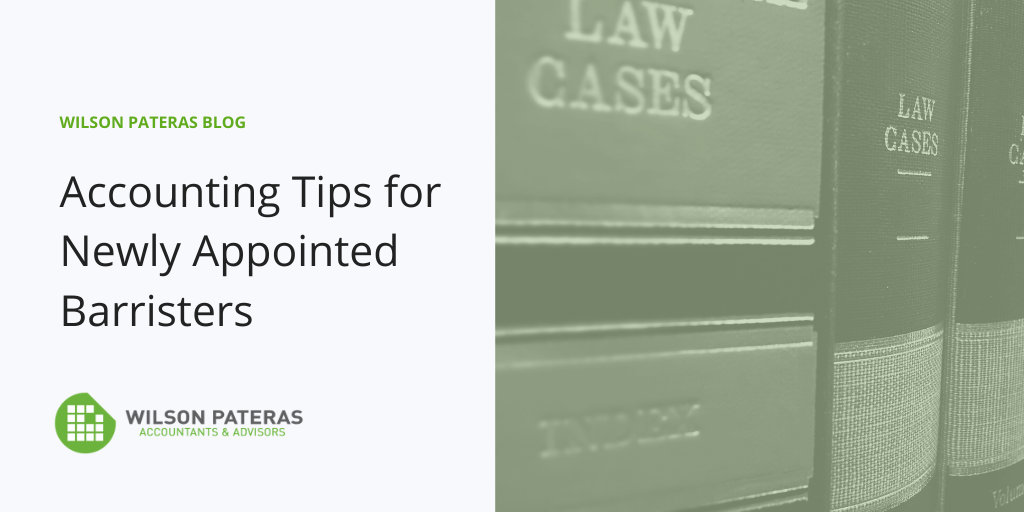
If you have just completed your Readers’ Course and have signed the Roll of Counsel, congratulations! You obviously have a wealth of specialist legal knowledge and have worked hard to get where you are.
From a business structure perspective, you will need to operate as a sole trader as a barrister and apply for your own ABN (Australian Business Number). You may have never previously operated as a sole trader in your legal career (for example, you might have worked as an employed lawyer in a partnership or incorporated legal practice).
Even if you have been a sole trader in the past, it is important to remain aware of all the financial implications. Here are our top accounting tips to help you.
Register for GST and account for it on a cash basis
Registering for GST will allow you to claim the GST that you pay for your business expenses as “input tax credits” on your quarterly Business Activity Statement (BAS). You will need to lodge your BAS each quarter to with the Australian Taxation Office (ATO).
Accounting for the GST on your income and expenses on a cash basis is generally the easiest way. This means that you:
- report GST income on your BAS only when you receive client payments (not on the date you send your invoice), and
- report the GST portion of your expenses only when you pay them (not when you receive invoices with future payment dates).
Budget for your first tax bill
When you commence operation as a sole trader, your income will need to be declared on your personal tax return at the end of the first financial year in which you start operating. That income will be taxed at your marginal rate and you will have to pay the tax you owe in a lump sum on the due date of your tax return.
This lump sum tax bill could be a significant amount, especially if:
- you start working as a sole-trading barrister early in the financial year; and/or
- you have previously worked as an employee for an incorporated legal practice and are used to having your income taxed fortnightly or monthly by your employer under the pay-as-you-go (PAYG) system.
It is important to budget for your first annual tax bill as a barrister (for example, by estimating what your likely income and the associated tax obligation will be, and then regularly diverting an appropriate amount of funds to a separate bank account).
Please be aware that your first tax bill as a sole trader/barrister could be quite high because it will be for all the taxable income you have earned for up to a year. However, after you have lodged this first annual tax return, budgeting for your tax will be easier because you will be sent a quarterly bill from the ATO based on your first year’s taxable income.
Claim all of your eligible business expenses
Make sure you claim all of your eligible business expenses. For example:
- business assets under the instant asset write-off scheme.
- your mobile phone plan.
- home office expenses if you regularly work from home.
- your specific clothing such as wigs, vests and gowns.
- professional association expenses.
- legal book and journal subscriptions.
- professional indemnity and income protection insurance premiums.
Being a legal practitioner, you will understand that tax minimisation is legal and sensible, while tax avoidance is illegal and carries heavy penalties.
Make sure you keep good records
Keeping good records has two major benefits:
- it helps to make preparing your quarterly business activity statements and annual tax returns much easier, and
- it helps you to prove your expenses claims if you are ever audited by the ATO. It is a legal requirement to keep expense records (such as invoices and bills) for at least five years after you lodge each BAS or tax return. If you get paper receipts, scan them so they don’t fade over time.
Engage an accountant and tax agent
Engaging a good accountant and tax agent has a number of potential benefits, including:
- ensuring your legal compliance with ATO requirements.
- saving you time and allowing you to focus on what you do best.
- saving you tax by making sure you maximise all of your eligible deductions.
- helping you to implement effective record-keeping systems and processes.
- extending the deadlines for submitting BAS and tax return lodgements to the ATO (the ATO imposes penalties for late lodgements and payments).
Make tax-deductible super contributions
If you were previously working in an incorporated legal practice, your employer would have been paying the 9.5% superannuation guarantee on your behalf. When you become a sole trader, you will need to decide if you want to make super contributions. There are two major reasons to do so:
- super contributions and earnings in Australia are taxed at the concessional rate of just 15%, which is lower than even the lowest marginal tax rate.
- you can claim up to $25,000 worth of super contributions you make as a tax deduction each year. This amount is known as the concessional contributions cap.
Superannuation can be a tax-effective way of building a nest
egg for retirement. To discuss superannuation even further you would
need to speak to a qualified financial specialist.
Take out appropriate insurance coverage
You would know that you need professional indemnity insurance to practise as a barrister,
but you should also consider taking out an appropriate amount of income protection insurance. This will protect you if you are temporarily unable to practise as a barrister due to illness or injury.
Any business-related insurance cover is also tax-deductible.
Develop a financial plan
Developing a financial plan is crucial for building and protecting your wealth. You should seek independent professional advice to help you make good financial decisions both professionally and personally. It is never too early or late to start planning your financial future.
How we can help
Our experienced team of accountants and tax planning advisors at Wilson Pateras in Richmond can help you to start your journey as a barrister on the right financial footing. We will take the time to understand your individual circumstances and financial goals before providing you with appropriate advice.
We can also help you with a range of other services, including:
- bookkeeping and Xero support,
- individual financial planning, Budgeting
- setting up a self-managed super fund, and
- tax planning.
Contact us today for a complimentary, obligation-free consultation to find out how we can help you!




